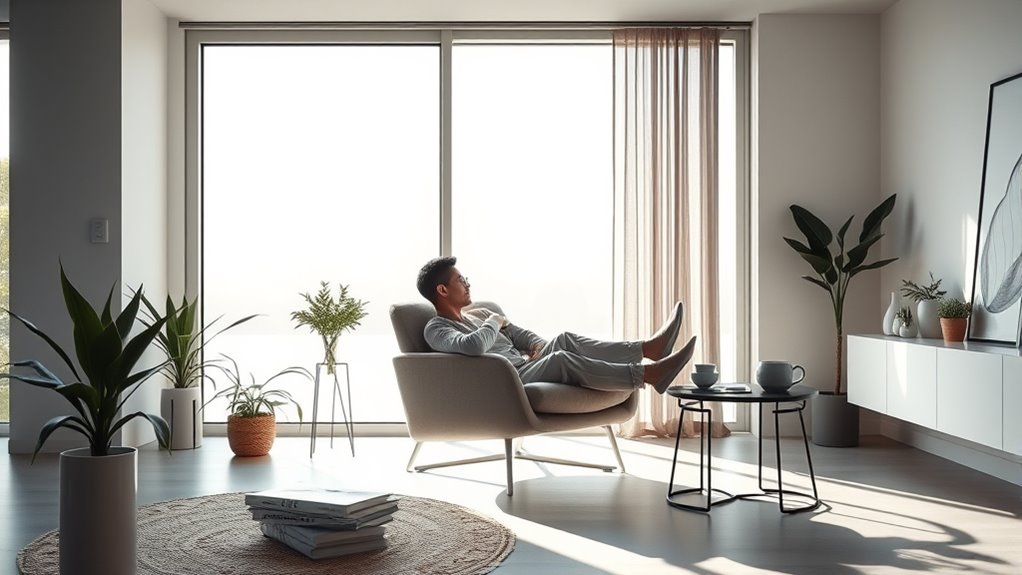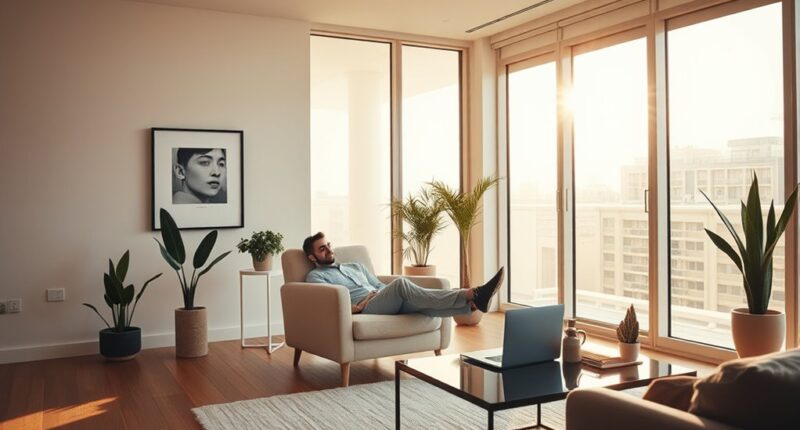The rise of solo living is changing society by reshaping how independence and community coexist. More people choose to live alone, often in urban areas, which can lead to feelings of isolation. To combat this, engaging in local events, joining social groups, and volunteering help build meaningful connections. These strategies turn solo lifestyles into opportunities for community engagement and personal growth. Keep exploring to find ways you can foster stronger bonds in your own life.
Key Takeaways
- Increasing solo living reflects broader societal shifts toward independence and changing views on community.
- Urban environments foster solo lifestyles, impacting urban development and social dynamics.
- Solo living can lead to feelings of loneliness, emphasizing the need for community engagement strategies.
- Participating in local activities and social groups helps reduce urban isolation and build support networks.
- Active community involvement transforms solo living into opportunities for meaningful connections and personal growth.

In recent years, more people are choosing to live solo, transforming how society views independence and community. As you consider this lifestyle shift, you might notice that living alone often comes with a sense of urban isolation. When you’re in a city filled with strangers, it can sometimes feel like you’re disconnected from your surroundings, even if you’re surrounded by people. The hustle and bustle may be motivating, but it can also make it harder to forge meaningful connections. Living solo in urban environments means maneuvering the balance between independence and the potential loneliness that can come with it. You may find yourself seeking ways to reduce urban isolation by intentionally engaging with your community. Participating in local events, volunteering, or joining neighborhood groups can help you foster a sense of belonging and counteract feelings of separation.
Community engagement becomes essential when living alone in a city. It’s up to you to take proactive steps to build connections that make your solo lifestyle more fulfilling. Instead of relying solely on your own company, you can seek out shared interests through clubs, classes, or social gatherings. These activities not only provide opportunities to meet new people but also create a support network that enhances your overall well-being. As you involve yourself in your community, you’ll discover that solo living doesn’t have to mean social isolation; rather, it can be an opportunity to deepen your engagement with those around you. This active participation helps combat the alienation often associated with urban living, making you feel more integrated and less like an outsider. Additionally, understanding the importance of home theatre projectors can enhance your personal space, making your home a more inviting environment for relaxation and socialization.
Furthermore, embracing community engagement helps you develop a sense of purpose and belonging. When you contribute your time and skills, you reinforce your connection to the city and its residents. This involvement fosters mutual support, which can be especially valuable if you face challenges or need assistance. As you build these relationships, you’ll likely notice a shift—urban isolation diminishes, replaced by meaningful interactions and shared experiences. Living solo doesn’t have to mean being alone; it’s about creating intentional opportunities to connect and grow within your community. So, whether it’s attending local events, volunteering, or simply striking up conversations with neighbors, your active efforts will shape a more enriching solo living experience, helping you thrive in an increasingly individualistic society.
Frequently Asked Questions
How Does Solo Living Impact Mental Health Over Time?
Solo living can impact your mental health over time, often increasing feelings of social isolation. Without regular social interactions, you might experience loneliness, which can lead to anxiety or depression. However, if you actively seek connections and maintain a support system, you can mitigate these effects. Being mindful of your mental health and staying engaged with friends or community activities helps prevent long-term negative impacts of solo living.
What Are the Environmental Benefits of Increased Solo Living?
You’ll find that increased solo living can positively impact the environment by reducing urban sprawl, as single-person households often occupy smaller spaces and promote more efficient land use. This lifestyle encourages resource conservation, since individuals tend to consume less water, energy, and materials. As a result, solo living helps create more sustainable communities, minimizes environmental footprints, and supports smarter urban development that benefits both the planet and your quality of life.
How Do Solo Dwellers Build Social Connections and Community?
You build social connections and community through active engagement in local events, clubs, or online groups that match your interests. Participating in community activities helps expand your social support networks, making you feel more connected. Volunteering or attending neighborhood gatherings also fosters meaningful relationships. By prioritizing community engagement, you strengthen your social ties, combat loneliness, and create a supportive environment that enriches your solo living experience.
What Policies Support or Hinder Single-Person Households?
Policies like housing affordability initiatives and favorable tax legislation either turbocharge or hinder your ability to live alone comfortably. When governments prioritize affordable housing, you find it easier to secure a place that matches your needs, but restrictive regulations or high taxes can make solo living an uphill battle. Supportive policies empower your independence, while hindering ones threaten your capacity to enjoy the freedom and flexibility single living offers.
How Does Solo Living Influence Personal Financial Management?
Solo living pushes you to prioritize personal budgeting, as you’re solely responsible for managing expenses. This lifestyle encourages financial independence, making you more mindful of saving, investing, and controlling costs. You learn to balance needs and wants without relying on others. While it may require discipline, it ultimately helps you develop strong financial habits, empowering you to achieve long-term stability and confidence in your economic choices.
Conclusion
As you embrace solo living, you become part of a larger societal shift, shaping urban landscapes and redefining independence. This lifestyle fosters self-discovery and resilience, proving that sometimes, the best way to find yourself is by standing alone. Remember, “Fortune favors the bold”—your willingness to adapt and thrive on your own paves the way for a more dynamic, diverse society. Embrace this change; it’s your chance to make a lasting impact.








